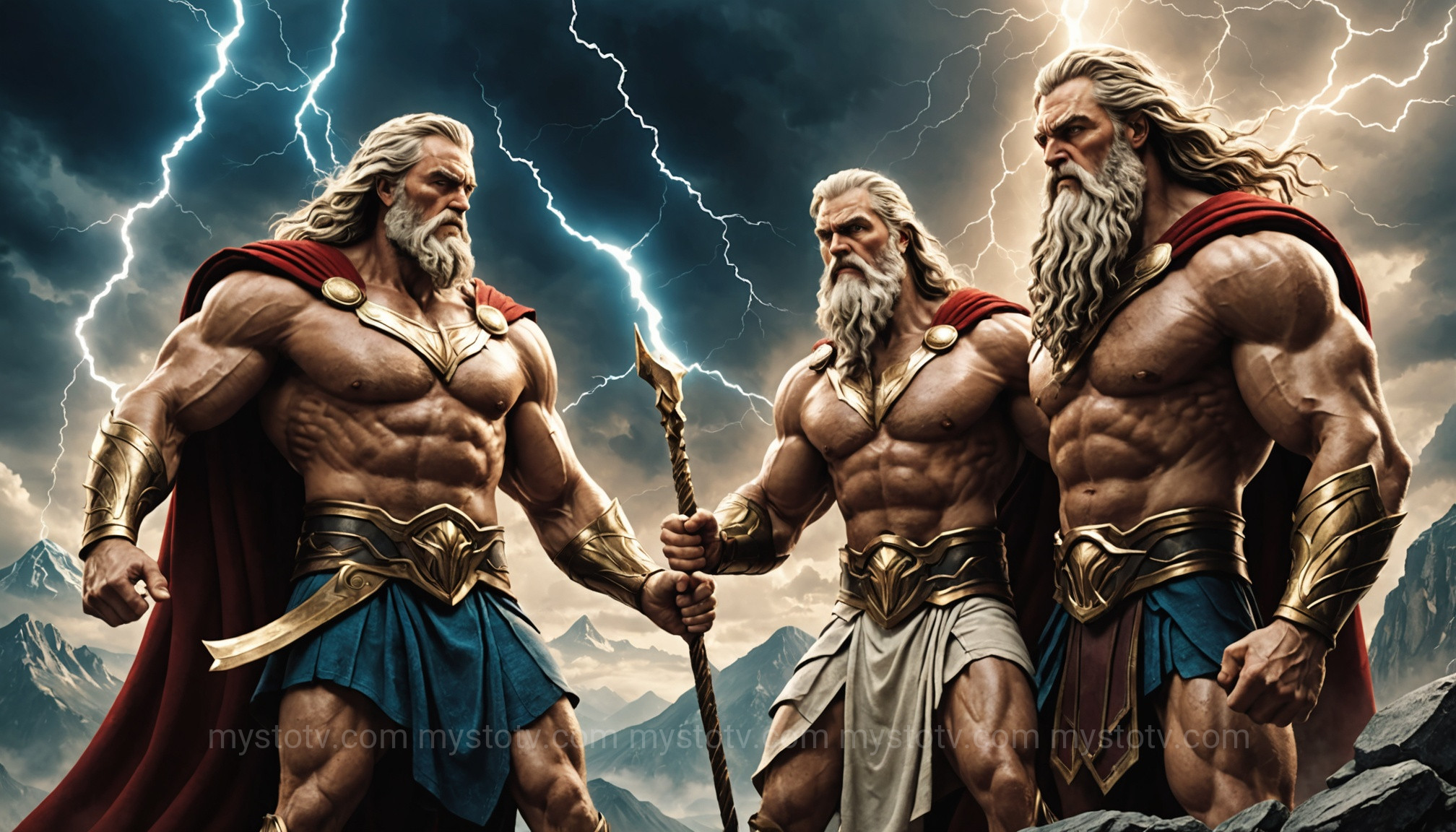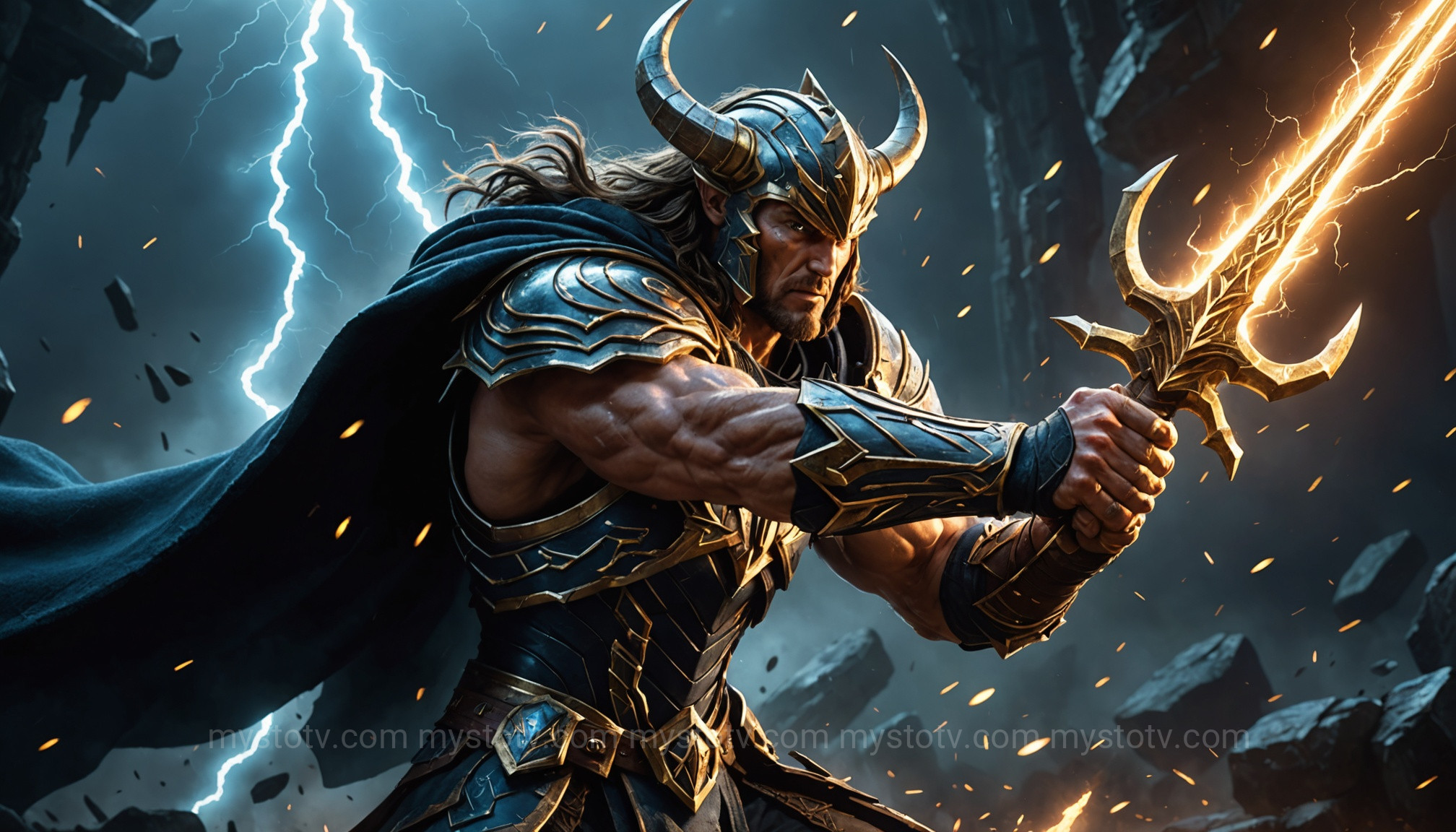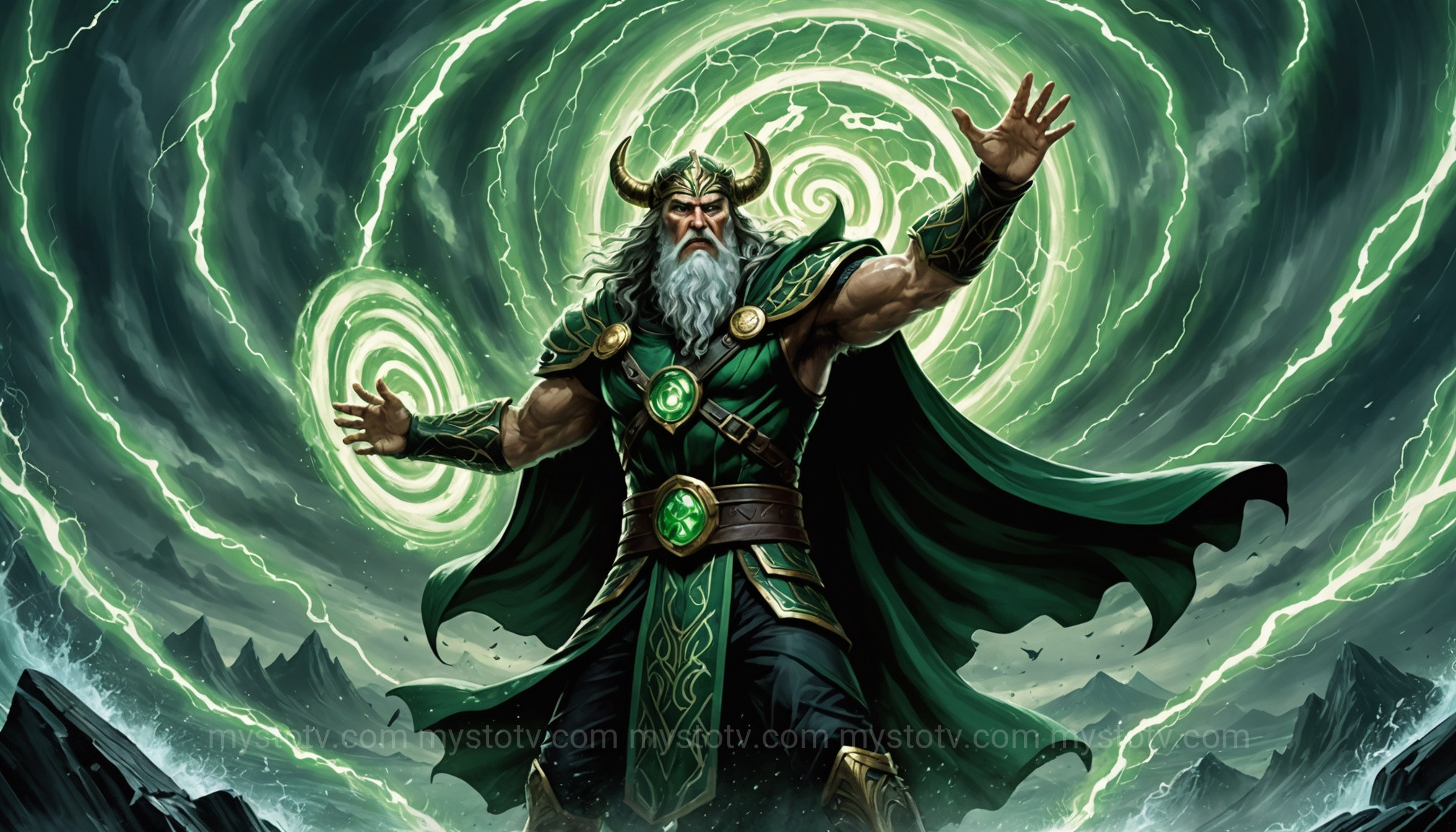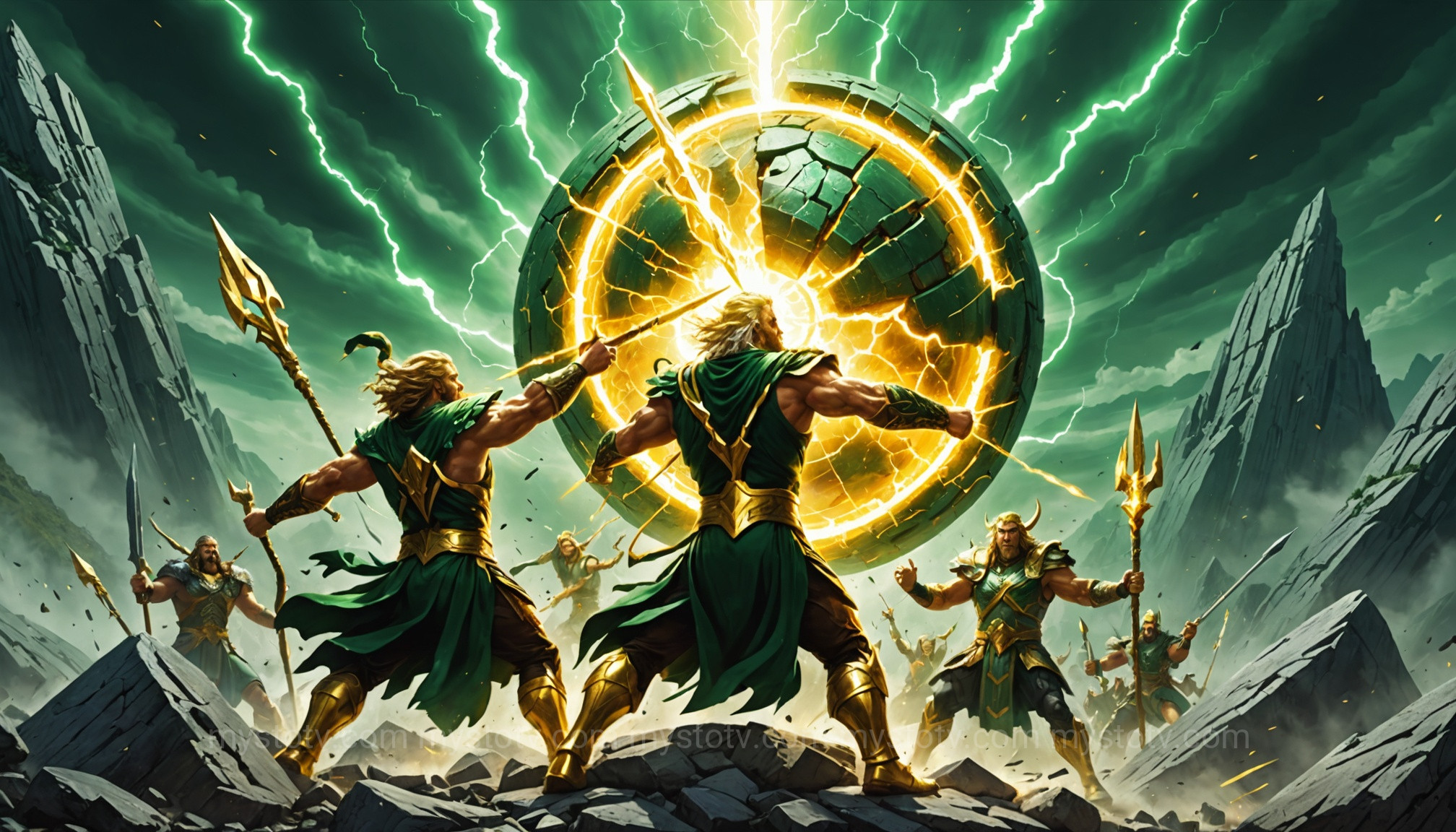I remember it clearly. It was a late-night session, hunched over a flickering screen, controller in hand, playing a game that pitted gods against each other. My friend, a die-hard Norse mythology enthusiast, was adamant. "Odin's cunning and magic would outsmart Zeus any day." I, having grown up on tales of the Olympians, countered, "No way. Zeus's raw power is absolute. One lightning bolt and it's over." This friendly argument, a scene replayed in countless dorm rooms and online forums, sparked a genuine curiosity. It's more than just a power-scaling fantasy; it’s a clash of cultures, philosophies, and what it means to be a king. The question of zeus vs odin who would win isn't just about fictional fisticuffs; it's a deep dive into the very essence of two of the most powerful figures in human mythology.
Contents
- 1 Tale of the Tape: Investigating Zeus vs Odin Who Would Win
- 2 Round 1: Physical Prowess and Weaponry - A Deep Dive into Zeus vs Odin Who Would Win
- 3 Round 2: Magical Abilities and Divine Powers - Analyzing Zeus vs Odin Who Would Win
- 4 Round 3: Intelligence, Strategy, and Allies - The Deciding Factor in Zeus vs Odin Who Would Win
- 5 The Final Verdict: So, in the Battle of Zeus vs Odin Who Would Win?
- 6 Frequently Asked Questions about the Zeus vs Odin Showdown
- 7 References
- 8 Conclusion: The Enduring Appeal of the Zeus vs Odin Who Would Win Debate
Tale of the Tape: Investigating Zeus vs Odin Who Would Win

Before the first blow is thrown, we must understand the combatants. This isn't just a simple comparison of strength; it's a look at their origins, their rule, and their very nature. These are not merely super-powered beings; they are kings, strategists, and patriarchs who carry the weight of their pantheons. Analyzing who they are is the first step in the complex calculation of zeus vs odin who would win.
Zeus, the Olympian King: A Profile for the Zeus vs Odin Who Would Win Showdown
Zeus, the King of the Gods and ruler of Mount Olympus, is a figure of immense and often terrifying power. Born the youngest son of the Titans Cronus and Rhea, his life began in rebellion. He famously led his siblings in the Titanomachy, a decade-long war against the previous generation of divine rulers. His victory, secured through brute force, strategic alliances, and the freeing of the Cyclopes who forged his mighty lightning bolts, established him as the undisputed sovereign of the cosmos. Zeus's domain is the sky and thunder, and his power is often depicted as absolute and primal. However, he is also a complex character—known for his wisdom and dispensation of justice, but equally for his tempestuous wrath and countless infidelities that often sowed chaos.
Odin, the Allfather of Asgard: A Profile for the Zeus vs Odin Who Would Win Showdown
Odin, the Allfather of the Æsir in Norse mythology, presents a starkly different model of kingship. While a formidable warrior, Odin's primary pursuit is not power for its own sake, but knowledge. He is the god of wisdom, war, poetry, and magic (specifically the arcane art of Seidr). His mythology is filled with tales of personal sacrifice for enlightenment: he hung himself from Yggdrasil, the world tree, for nine days and nights to learn the secrets of the runes, and he famously sacrificed one of his eyes for a drink from Mimir's Well of Wisdom. Odin is a wanderer, a seeker, and a master strategist who is perpetually preparing for the prophesied doom of Ragnarök. His power is more subtle than Zeus's—it lies in his intellect, his command of esoteric forces, and his long-term planning.
Round 1: Physical Prowess and Weaponry - A Deep Dive into Zeus vs Odin Who Would Win

In any direct confrontation, the physical attributes and armaments of the combatants are paramount. Both Zeus and Odin are gods of war in their own right, leading their pantheons into cosmic battles. But how they fight, and what they fight with, differs significantly. This round breaks down their raw strength and legendary weapons, a critical factor in determining zeus vs odin who would win.
Zeus's Brute Strength and the Master Bolt
Zeus's physical power is legendary and often described in cataclysmic terms. In his battle against the monstrous Typhon—a beast so vast its head brushed the stars—Zeus seared the monster with his bolts and ultimately trapped it beneath Mount Etna. This wasn't just a simple fight; it was an act of terraforming through sheer divine force. He has hurled mountains and demonstrated strength capable of shaking the cosmos itself. His primary weapon, the Master Bolt, is the ultimate divine artillery. Forged by the Cyclopes from pure celestial energy, it is an instrument of absolute destruction, capable of leveling mountains and vanquishing even the most powerful immortals. In terms of raw, explosive power output, Zeus is arguably unmatched in any mythology. His combat style is that of a divine juggernaut, overwhelming his foes with unstoppable force.
Odin's Combat Skill and the Spear Gungnir
Odin's physical prowess is less about raw, explosive strength and more about the hardened skill of a veteran warrior-king. He is a master of combat strategy, having led the Æsir in their long and brutal war against the Vanir. While he may not be as physically strong as his son Thor, he is a far more experienced and calculating fighter. His greatest asset in this domain is his spear, Gungnir. Forged by the dwarves, this weapon is magically enchanted to never miss its target and to always return to Odin's hand. This is a crucial distinction: while Zeus's bolt is a weapon of mass destruction, Gungnir is a weapon of absolute precision. It cannot be dodged or blocked by conventional means. In a one-on-one duel, the ability to land a guaranteed, fatal blow is an incredible advantage. This turns the physical contest from a simple power-scaling exercise into a question of overwhelming force versus perfect accuracy.
Round 2: Magical Abilities and Divine Powers - Analyzing Zeus vs Odin Who Would Win

Beyond the clash of steel and lightning, a battle between these two kings would inevitably become a contest of divine and mystical energies. Both wield powers that can bend reality to their will, but the nature and source of these powers are fundamentally different. Understanding this magical disparity is essential to forming a complete picture of zeus vs odin who would win.
Zeus's Control Over the Sky and Storms
Zeus’s "magic" is less about arcane rituals and more an extension of his being. As the god of the sky, his control over the weather is absolute. He can summon winds, create impenetrable clouds, and call down storms of unimaginable fury. This is not just throwing lightning; it is total atmospheric and battlefield control. He can blind his opponent with fog, buffet them with hurricane-force winds, or simply strike them from any direction with his bolts. Furthermore, Zeus possesses the power of shapeshifting, a tool he used frequently (if often for morally dubious reasons) to deceive and infiltrate. This ability to change his form could be a potent weapon in a duel, allowing for feints, ambushes, and strategic repositioning. His power is elemental, direct, and overwhelming.
Odin's Mastery of Seidr Magic and Runes
Odin's magic is of a different, more insidious, and arguably more versatile kind. He is a master of Seidr, a form of Norse magic considered somewhat unmanly by other gods, which involves shaping destiny, weaving illusions, and communing with spirits. This allows him to attack an opponent not just physically, but mentally and spiritually. He could potentially create illusions so real that Zeus would be fighting phantoms, or even delve into Zeus's mind to exploit his notorious paranoia and arrogance. Moreover, Odin’s sacrifice to learn the runes gave him dominion over a fundamental cosmic force. Runes are not just an alphabet; they are symbols of immense power that can be used to curse, protect, or divine the future. Odin could lay magical traps, curse Zeus's strength, or even gain a precognitive edge in the battle, knowing Zeus’s next move before he makes it. While Zeus's power is a hammer, Odin's is a set of surgical tools capable of dismantling an opponent from the inside out.
Round 3: Intelligence, Strategy, and Allies - The Deciding Factor in Zeus vs Odin Who Would Win
A fight to the death between two kings is rarely decided by strength or magic alone. Cunning, foresight, and the ability to rally powerful allies are often the keys to victory. Both Zeus and Odin are master strategists who have secured their thrones through intellect as much as power. This final round of analysis, focusing on their minds and their armies, might be the most critical in resolving the debate of zeus vs odin who would win.
Zeus's Cunning and the Olympian Pantheon
Zeus's intelligence is often characterized by a reactive, paranoid cunning. He is brilliant at political maneuvering and maintaining his grip on power, often by preemptively neutralizing threats. He outsmarted his father Cronus to start the Titanomachy and was clever enough to swallow his first wife, Metis, to prevent a prophecy that her son would overthrow him. While not a seeker of knowledge like Odin, Zeus is a master of divine politics and counter-insurgency. Should the duel expand, Zeus commands the Olympian pantheon—a formidable collection of gods with diverse and potent abilities. He has Ares, the god of war; Athena, the goddess of strategy; Hephaestus, the divine smith; and Poseidon, who commands the seas. This is a powerful and relatively unified force (when Zeus can keep them in line) that could be brought to bear against any threat.
Odin's Sacrifices for Knowledge and the Einherjar
Odin's intelligence is proactive and knowledge-based. He doesn't just react to threats; he actively seeks out the wisdom needed to confront future cataclysms, namely Ragnarök. This long-term, almost obsessive, strategic planning is his defining trait. His ravens, Huginn (Thought) and Muninn (Memory), fly across the nine realms daily to bring him news, giving him unparalleled intelligence. He understands sacrifice, prophecy, and the intricate workings of fate in a way Zeus does not. In terms of allies, Odin's army is built for a single, final purpose: the end of the world. He gathers the souls of the greatest mortal warriors, the Einherjar, in Valhalla. These are not just allies; they are a fanatically loyal and endlessly training army, preparing for the final battle. While the Olympians are a powerful family, the Einherjar are a dedicated military force with a singular focus, commanded by a god who sees the grandest of all strategic pictures. It's a classic matchup: a powerful standing army versus a meticulously prepared doomsday force.
The Final Verdict: So, in the Battle of Zeus vs Odin Who Would Win?

After analyzing their physical attributes, magical prowess, and strategic minds, the moment of truth arrives. We must weigh the evidence from the myths and posit a final outcome. The question of zeus vs odin who would win is not one with a simple answer, as the outcome could hinge on the specific conditions of the fight. Let’s explore the most compelling arguments for each god.
The Argument for Zeus's Victory
The case for Zeus rests on one, undeniable fact: raw, overwhelming power. In a direct, no-holds-barred confrontation, Zeus's ability to unleash cosmic-level destruction is likely too much for Odin to handle. The Master Bolt is not just a weapon; it is a force of nature. While Gungnir cannot miss, it's debatable whether it could even be thrown if Odin is being simultaneously blinded, deafened, and pummeled by a god-tier hurricane. Zeus fought and imprisoned the Titans, who were primordial forces of nature themselves. His feats of power, like defeating Typhon, seem to operate on a scale beyond most of what we see in Norse mythology. If Zeus can close the distance and bring his full, furious power to bear quickly, he could overwhelm Odin before the Allfather’s more subtle strategies can take root. The verdict here is a swift, brutal victory by knockout.
The Argument for Odin's Triumph
Odin's path to victory is paved with intellect, foresight, and esoteric magic. He would not engage Zeus in a contest of pure strength; that is a fool's errand. Odin's strategy would be one of attrition, illusion, and misdirection. He would use his Seidr magic to create decoys, attack Zeus’s mind, and exploit the Greek god's well-known arrogance and short temper. Odin is the ultimate prepper; he would have studied his opponent, identified his weaknesses, and laid magical traps long before the first blow. The key is Gungnir. If Odin can create an opening—through an illusion, a binding rune, or by goading Zeus into a reckless attack—he needs to land only one perfect strike. A weapon that never misses is the perfect counter to a foe who relies on overwhelming power. This is a victory by surgical strike, a masterclass in strategy over brute force. Odin's strategic mind, honed by his sacrifices, would be his greatest weapon.
The Most Likely Outcome
Considering all factors, the outcome most likely depends on the engagement's timeframe. In a spontaneous, surprise confrontation—a "ring the bell" style duel—Zeus's explosive power gives him a significant edge. He is faster to anger and faster to unleash his ultimate destructive capabilities.
However, in a prolonged conflict or a war where preparation is possible, the odds shift dramatically in Odin's favor. Odin's entire existence is built around preparing for a future battle. His intelligence network, his command of destiny-shaping magic, and his patient, long-term strategy are tailor-made to dismantle a powerhouse like Zeus. Odin would likely evade direct conflict, wearing Zeus down with magical attacks, illusions, and psychological warfare until the King of Olympus makes a fatal error. Then, the unerring Gungnir would find its mark.
Therefore, while it's a tantalizingly close match, the ultimate victor is likely Odin. Zeus fights to maintain his power, but Odin fights with the wisdom that all power is fleeting. He has faced the certainty of his own death at Ragnarök and has spent centuries preparing for it. This acceptance and foresight grant him a mental and strategic advantage that pure power, however immense, cannot overcome. Zeus wins the sprint, but Odin wins the marathon.
Frequently Asked Questions about the Zeus vs Odin Showdown
Here are answers to some common questions that arise when fans debate this mythological clash.
1. In pop culture like the God of War games, who is stronger?
In the God of War series, the portrayal suggests Zeus, particularly in his prime during the Greek saga, wields more raw, destructive power. He is the main antagonist and demonstrates incredible feats. Odin in God of War: Ragnarök is portrayed as immensely powerful, but his strength lies more in his cunning, manipulation, and magical knowledge. Kratos is able to defeat them both, but the context and tools used are different. The games prioritize narrative, so direct power-scaling is tricky, but Greek-era Zeus is depicted as a pinnacle of raw force.
2. Couldn't Zeus just shapeshift to trick Odin?
While Zeus is a master shapeshifter, Odin is a master of illusion and deception himself, and more importantly, a seeker of knowledge. Odin's ravens, Huginn and Muninn, provide him with intelligence from all nine realms. Furthermore, his sacrifice for wisdom and his command of Seidr magic give him a deep perception that likely transcends simple physical disguises. It's highly probable that Odin's magical senses would see through Zeus's trickery, turning one of the Greek god's favorite tactics against him.
3. Who has the more powerful children or allies?
This is a close contest. Zeus has Heracles, a demi-god of immense strength; Athena, a peerless strategist; and Poseidon, ruler of the seas. Odin has Thor, a god of strength whose might rivals Zeus's own; Baldr, who was nearly invincible; and Tyr, a god of war. Both pantheons are incredibly powerful. However, Odin's Einherjar—the host of elite mortal warriors in Valhalla—give him a dedicated standing army that the more fractious Olympians lack. While the top-tier power of the Olympians is immense, Odin's forces are arguably better organized for a large-scale war.
References
- Hesiod, and M. L. West (translator). Theogony & Works and Days. Oxford University Press, 1988. https://global.oup.com/academic/product/theogony-and-works-and-days-9780199538317
- Sturluson, Snorri, and Jesse L. Byock (translator). The Prose Edda. Penguin Classics, 2005. https://www.penguinrandomhouse.com/books/292403/the-prose-edda-by-snorri-sturluson-translated-by-jesse-l-byock/
- Lindow, John. Norse Mythology: A Guide to the Gods, Heroes, Rituals, and Beliefs. Oxford University Press, 2002. https://global.oup.com/academic/product/norse-mythology-9780195153828
- Hard, Robin. The Routledge Handbook of Greek Mythology. Routledge, 2004. Provides comprehensive accounts of Zeus's myths, including the Titanomachy and his battle with Typhon.
Conclusion: The Enduring Appeal of the Zeus vs Odin Who Would Win Debate
The epic question of zeus vs odin who would win will likely never have a definitive, universally accepted answer, and that is precisely what makes it so compelling. It's a battle that transcends a simple list of powers and abilities, forcing us to compare raw, untamed force against calculated, hard-won wisdom. Zeus represents absolute authority and the power to shape the world with thunderous finality. Odin embodies the long game—the belief that knowledge, foresight, and strategic sacrifice are the ultimate weapons. In the end, your chosen victor often reflects your own philosophy: do you believe overwhelming strength carries the day, or does cunning and preparation ultimately triumph? This mythological showdown is more than a fantasy fight; it's a timeless exploration of the very nature of power, leadership, and destiny.